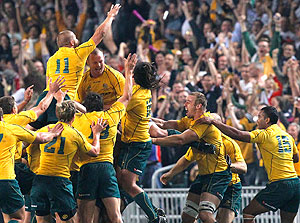Expert

Australia Wallabies players celebrate after they defeated New Zealand All Blacks in the DHL Hong Kong Bledisloe Cup rugby match in Hong Kong Saturday, Oct. 30, 2010. Australia won 26-24. (AP Photo/Vincent Yu)
When the news media people trooped into the Australian Rugby Union’s headquarters on Tuesday we were given a bag of goodies that gave away the Wallabies’ international logo and slogan for this Rugby World Cup year. The slogan was brilliant in its simplicity, impact and resonance: “One Team 2011.”
The presentation began with the advertisement that will be used to promote the short international season. It featured flashing Wallabies tries, a thumping musical score and the background cry of the Fox Sports rugby commentator Greg Clarke yelling out as a player touched down, “try to the Wallabies!”
This was stirring stuff.
Then the chief executive of the ARU, John O’Neill, explained the concepts behind the slogan. The core idea came he said, from Robbie Deans. The Wallabies want to go into the Rugby World Cup tournament a united, single-minded side backed not just by rugby supporters but all sports-loving Australians.
“We want to finish 2011 as the number one rugby nation in the world,” O’Neill insisted. “The slogan is a call to arms for all Australians to embrace … The Wallabies have the talent to do extraordinary things this season. In our last few Tests we have beaten the Springboks, the All Blacks and France. We want all Australians on board to show the world we are a nation behind an iconic team.”
This rousing rhetoric was followed with a film clip of the Prime Minister, discarding her AFL allegiances to tell Australians to get behind the Wallabies and Robbie Deans to win the Rugby World Cup.
Then Robbie Deans explained that the best teams are those who play together as one unit: “Teams can’t compete successfully when they operate as individuals. The slogan is a reflection of what we stand for.”
Simon Poidevin, a hero of the 1991 Rugby World Cup triumph, went through the highs and lows of that tournament. He emphasised how important it was for the team’s success to know that all Australia, not just rugby supporters, were behind the team. The Wallabies received 10,000 faxes in the days leading up to the final, a gersture of national solidarity that inspired the team to go on and do great things.
My take on all this is that the ARU have cleverly incorporated a number of elements in their slogan. There is the unabashed appeal for national support. This will work, as long as the Wallabies are successful in the Tri Nations and in the World Cup tournament, a point made by Poidevin. By successful, I would guess making the World Cup final (and playing the All Blacks?) would hit the target.
There is also a message to the players in the slogan, too.
It is a matter of fact that when Deans took over the coaching role in 2008, the Wallabies culture was that of player power centered on a group of senior players. One by one, sometimes to the detriment of the team’s then strength, the recalcitrants have been weeded out.
Eager youngsters have been brought in to give the team a new lease of life, and the older players who have been retained have bought into the Deans system that the culture of the team is that everyone plays for the team.
As he said at the launch: “The ultimate is to have as all standing together, united, as One Team. That is a force that would be more than powerful. It would be irresistible.”
This rhetoric should not be dismissed as mere words. The World Cup will have to be won on the fields of New Zealand. But before the victories come the idea of victory. As Sun Tzu, the Chinese warrior-philosopher who inspired Rod Macqueen’s coaching in the 1999 World Cup, states: “All victories are won before the battle.”